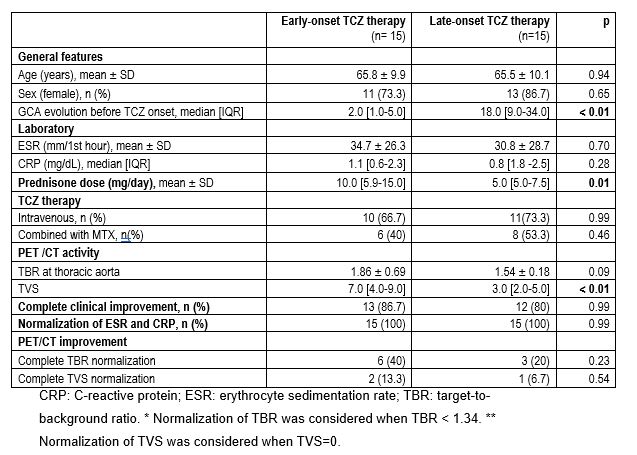Session Information
Date: Monday, November 8, 2021
Session Type: Poster Session C
Session Time: 8:30AM-10:30AM
Background/Purpose: Tocilizumab (TCZ) has shown efficacy in large vessel vasculitis (LVV)-Giant Cell Arteritis (LVV-GCA) (1-2). 18F-fluodeoxyglucose positron emission tomography (18F-FDG PET/CT) is useful to assess LVV disease activity (3-5). It is unknown if early treatment with TCZ may have an influence on clinical, laboratory and imaging outcomes. Our aim was to assess clinical, laboratory and PET/CT activity improvement in LVV-GCA patients treated with TCZ according to the time from disease diagnosis to TCZ onset.
Methods: Comparative single-center study of 30 LVV-GCA patients treated with TCZ who were divided into 2 groups depending on the time of onset of TCZ: a) early onset (≤ 6 months; n=15) and b) late onset ( > 6 months; n=15). All patients had a baseline and a follow-up PET/CT scan. Complete clinical improvement and normalization of laboratory markers (CRP ≤0.5mg/dL and/or ESR ≤ 20 mm/1st hour) was assessed. For imaging evaluation, normalization of total visual score (TVS) was considered when TVS = 0 and normalization of semiquantitative activity if the target to background ratio (TBR) at the thoracic aorta was < 1.34.
Results: 30 patients were included (24 women/6 men); mean age 65.7± 9.8 years. Patients in the TCZ early-onset group were receiving higher doses of prednisone (10.0[5.9-15.0] vs 5.0 [5.0-7.5] mg/day; p< 0.01) and had higher TVS scores (7.0 [4.0-9.0] vs 3.0 [2.0-5.0]; p< 0.01) at baseline (Table). Following TCZ initiation, after a mean of 10.8±3.7 months, most patients achieved complete clinical improvement and normalization of ESR and CRP in both groups. Uncoupling with imaging outcomes was observed in both groups. Although non-significant statistical differences were observed, complete TBR normalization (TBR < 1.34) and complete TVS normalization (TVS=0) tended to be more frequent in the group ofpatients who received early-onset TCZ therapy (Figure).
Conclusion: TCZ was effective in patients with LVV-GCA regardless the time from disease diagnosis to TCZ onset. However, complete normalization of vascular activity in PET/CT scans tended to occur more likely in patients who receive early-onset TCZ therapy within the first 6 months of the disease.
References:
1. Calderón-Goercke M et al. Semin Arthritis Rheum. 2019; 49:126-135.
2. Prieto Peña D et al. Clin Exp Rheumatol. 2020. PMID: 33253103
3. González-Gay MA et al. Expert Rev Clin Immunol. 2018; 14:593-605.
4. Martínez-Rodríguez et al. Semin Arthritis Rheum. 2018; 47(4): 530-537.
5. Prieto-Peña D et al. Semin Arthritis Rheum. 2019; 48:720-727.
To cite this abstract in AMA style:
Prieto-Peña D, Martínez-Rodríguez I, Atienza-Mateo B, Gómez De La Fuente F, Sánchez-Salmón A, gonzalez-Gay M, Blanco R. Clinical, Laboratory and Imaging Outcomes in Tocilizumab-Treated Patients with Large Vessel-Giant Cell Arteritis According to Early Onset Therapy [abstract]. Arthritis Rheumatol. 2021; 73 (suppl 9). https://acrabstracts.org/abstract/clinical-laboratory-and-imaging-outcomes-in-tocilizumab-treated-patients-with-large-vessel-giant-cell-arteritis-according-to-early-onset-therapy/. Accessed .« Back to ACR Convergence 2021
ACR Meeting Abstracts - https://acrabstracts.org/abstract/clinical-laboratory-and-imaging-outcomes-in-tocilizumab-treated-patients-with-large-vessel-giant-cell-arteritis-according-to-early-onset-therapy/


